Heartbroken American adoptive parents are pleading with the US government to step in and help get their adopted children out of violence-torn Haiti and into America.
“Our children will not survive this,” warned adoptive mother Michelle Reed, who is trying to get her adopted six-year-old son Esai home to Florida to reunite with his two biological siblings, whom she previously adopted.
Reed is one of several parents who spoke to DailyMail.com about their struggles with seeing violence in Haiti led by gang leader Jimmy ‘Barbecue’ Chevrizier.
“The last time I talked to my son, I could hear gunshots in the background,” Reed added, saying gang members had already stormed the orphanage not two weeks earlier.
‘Everyone was screaming, they were looking for a car and saying “we’ll be back to take what we need”, it’s very alarming.
“My son asks, “When can I come home? When are you going to pick me up?’Every time I hang up, there’s that uncertainty,” Reed said.
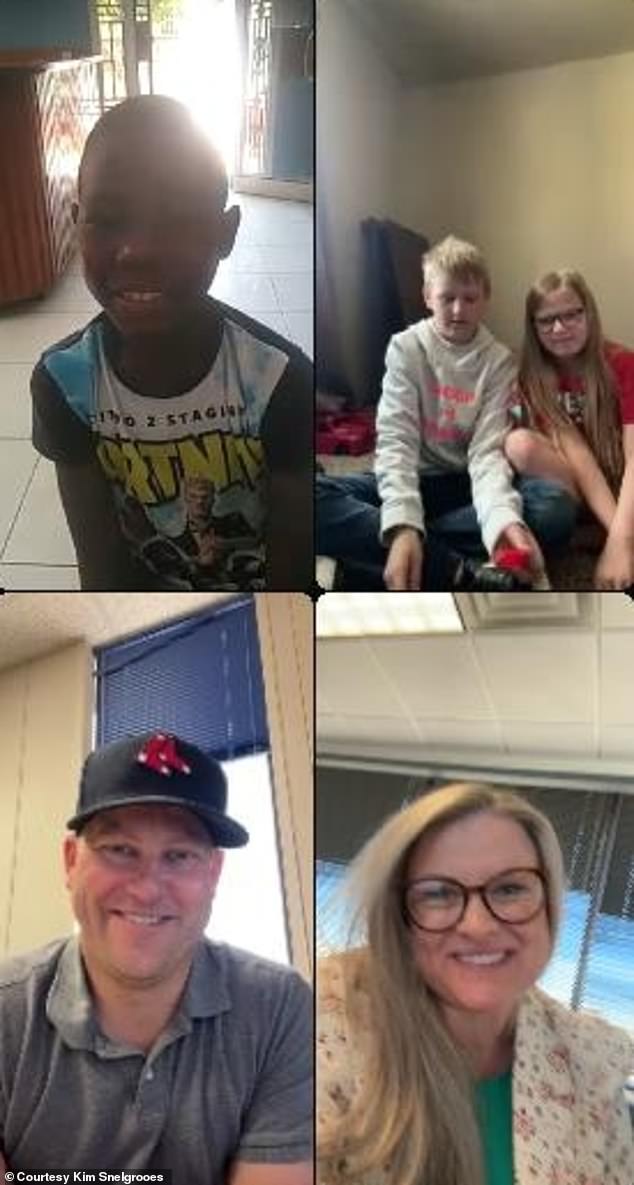
Hundreds of heartbroken American adoptive parents plead with the US government to allow their children to return home from violence-torn Haiti
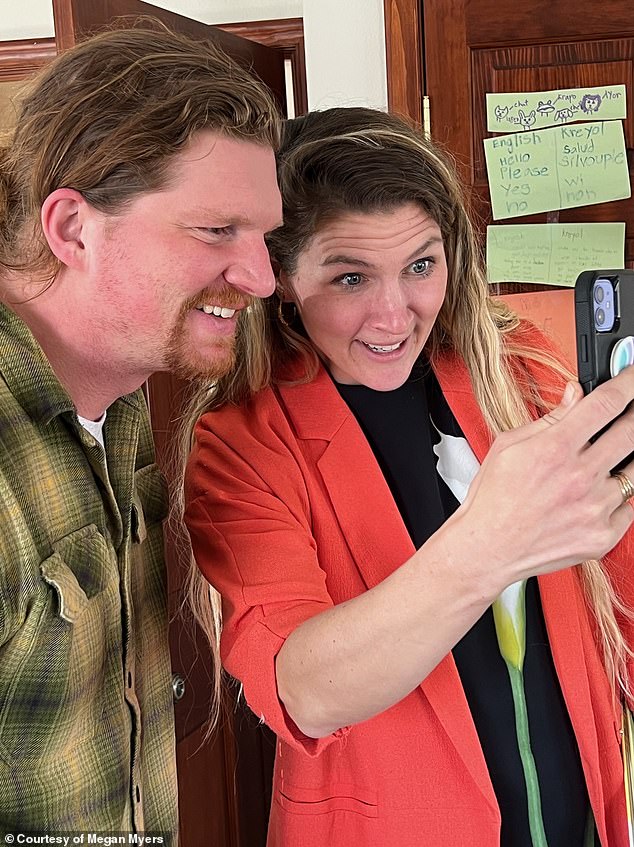

Megan and Chris Myers are the legal parents of their five-year-old son Jeff and are asking the US government to waive the requirement for additional documents needed to bring him home
Among her concerns is the blocking of roads, which is preventing help from reaching the city.
‘The lack of resources is worrying that they will run out of water, food will run out in about two weeks. It just took everything away from them,’ Reed said.
‘I feel really helpless, but I have a strong faith that gets me through.’
Many parents like Reed are having a hard time getting their children out of Haiti.
They are demanding that the United States grant humanitarian parole, which would allow the children to be evacuated to a safe place before continuing the adoption process.
A similar process was launched in the wake of the 2010 earthquake in Haiti, although it met with some criticism. But Reed argues that the urgency of the situation demands an appropriate response.
“I understand there are concerns, but Haiti is now a Hague country, so there are many more safeguards in place that will allow us to get them out and continue the legal adoption process,” she said.
Meanwhile, parents who already have adoption decrees — essentially final paperwork — are being asked to submit additional documents to Haitian authorities before their children can be released.
But they have pointed out that gang rule in the country means traveling to submit additional paperwork is difficult, if not impossible, because of attacks on government buildings in the country, including the Interior Ministry, which was burned down on Saturday.
All US embassy staff have already been evacuated, meaning there is no one to receive any documents.
“It’s a nightmare,” said Megan Myers, a Spanish professor at Iowa who specializes in Haitian and Dominican history.
She and her husband Chris were weeks away from meeting their adopted son Jeff, five, after a five-year adoption process when the violence broke out.
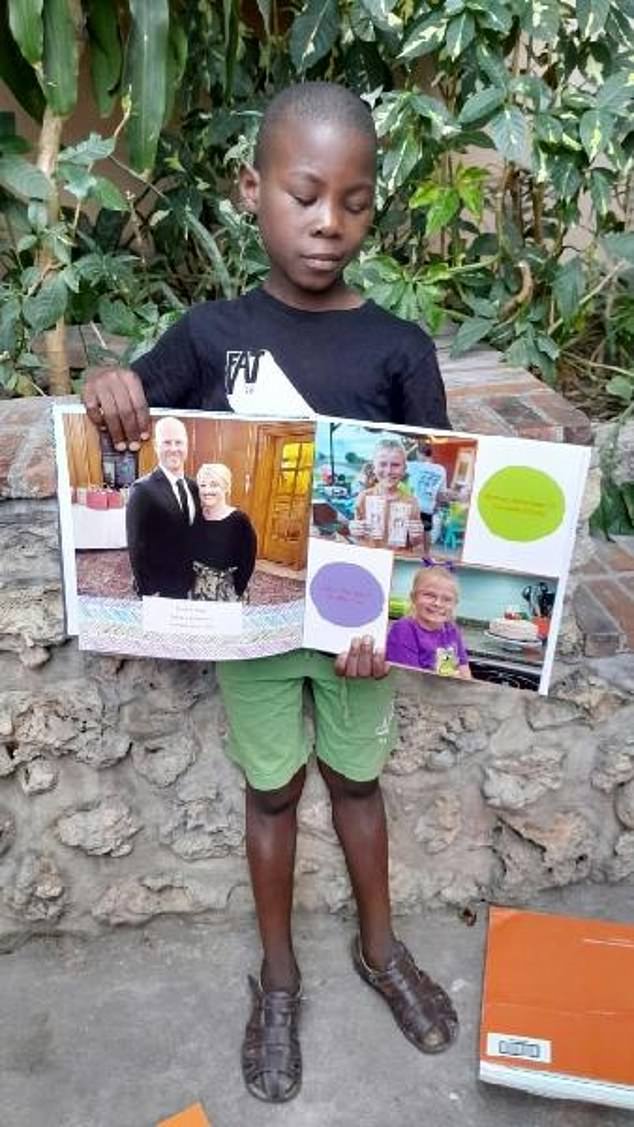

Parents who have not obtained an adoption decree are also pleading with the US government to grant humanitarian parole to allow them to bring the children to safety
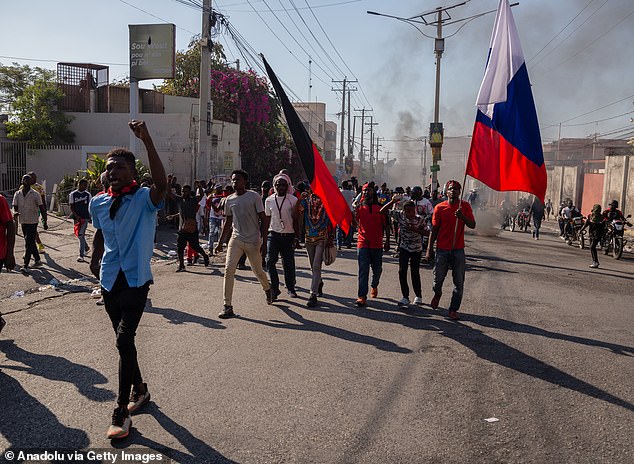

People carrying Haitian flags march during a demonstration demanding the resignation of Haitian Prime Minister Ariel Henry on Wednesday.
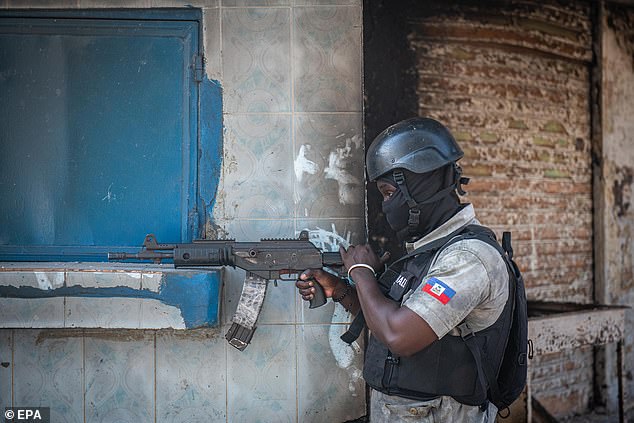

Gunned-down police in the Caribbean country battle rampaging gangs
“Every day I wake up and I just can’t imagine anything worse happening in our adoption process, it feels surreal,” she said.
‘We are so desperate to get him out, but at the same time I have to separate my selfish desire to get my son home with the understanding that we need a solution that is best for Haiti and they will find one way to move forward. involved in.’
Myers said she and her husband spend their days anxiously awaiting updates on their son, who is currently in a Haitian orphanage.
“He’s in an area that’s not in the epicenter, but it’s still worrying. There are children who we know have had to evacuate, or who are all sleeping in the basement in one room in orphanages. It’s not safe for anybody,” Myers said.
‘The growing problem is the lack of supplies, it’s becoming a real problem.’
The couple is calling on the US government to waive some of its demands, such as requiring children to travel on a Haitian passport, as it has done in other crises.
“There are several countries with precedents for this and in much less violent circumstances. The situation is changing so much that it’s hard to know what the next 24 hours will bring,” Myers added.
She and Reed said their pleas for help have fallen on deaf ears. They also shared concerns that the details of American adoptive families and their children are being shared after Haiti’s adoption agency was raided.
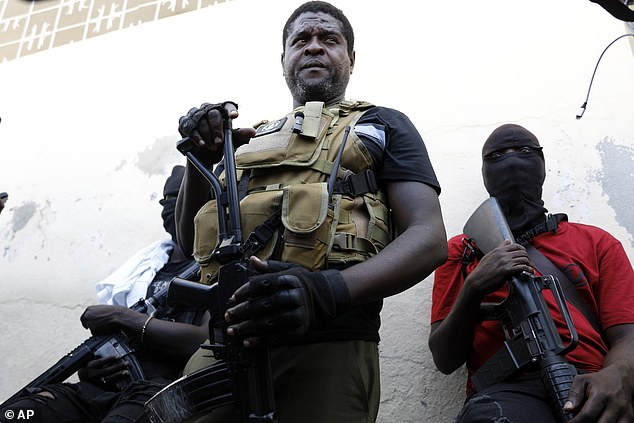

Port-au-Prince has been paralyzed in a fierce struggle for political power, with Jimmy ‘Barbecue’ Cherizier (pictured on Tuesday) – an influential gang leader in Haiti – warning of civil war and ‘genocide’ unless Prime Minister Ariel Henry is brought down. quit
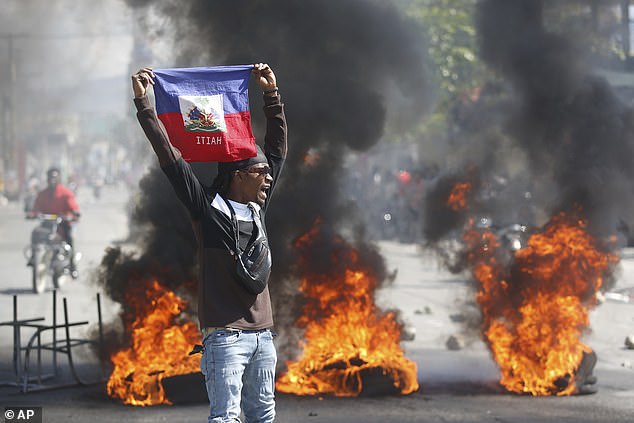

Gangs have burned down police stations, blown up the main international airport, which remains closed, and raided Haiti’s two largest prisons, freeing more than 4,000 prisoners. Pictured: A protester holds a Haitian flag as tires burn in the street behind him
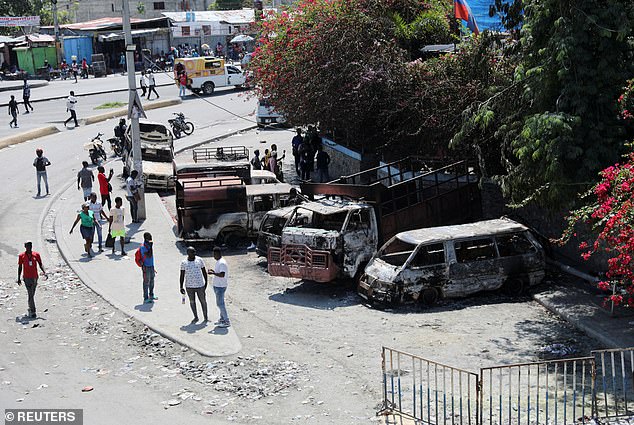

Vehicles set on fire by armed gangs on Monday night are seen outside the Carrefour de l’Aeroport sub-police station of the Haitian National Police (PNH), in Port-au-Prince, Haiti, March 5
This was echoed by Texas mother Kim Snelgrooes, whose file confirming the adoption her nine-year-old son was among those in the Haitian interior ministry when it was looted.
“It’s a big fear for us that our information has been lost,” she explained. ‘The area that my son is in is one of the most dangerous and has a high rate of kidnappings. If it were known that he has American parents, he would be targeted.
‘I am frustrated with the US government. We are asked to get his file from the MOI and present it to the US Embassy, but apparently there are no longer any staff working there.
‘I asked my representative what I can do and he said under the current rules I could theoretically fly to Haiti when the airport is open and then travel to Mexico and we could go into the southern border which is crazy.’
The National Council for Adoption estimates that about 100 American families are in the same position as the Myers and Snelgrooes.
Meanwhile, there are ‘several hundred’ more families going through the adoption process, with ‘thousands’ of orphans affected.
CEO Ryan Hanlon said the uprising has only exacerbated the families’ problems with Haiti’s lengthy adoption process.
“Parents are concerned about their children’s safety, and they make a demand that increases the length of time,” he said.
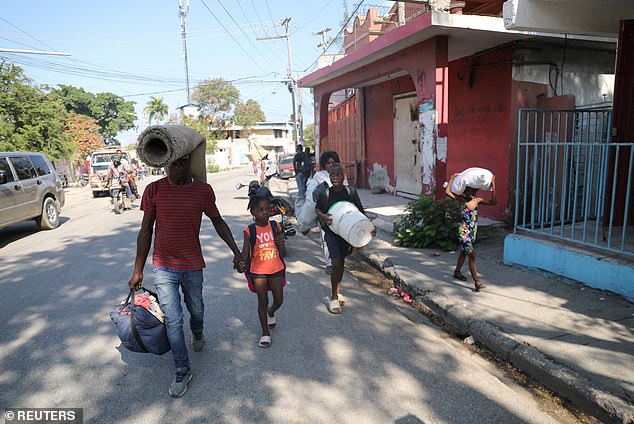

Meanwhile, gangs across the country continue to unite, causing thousands to flee their homes
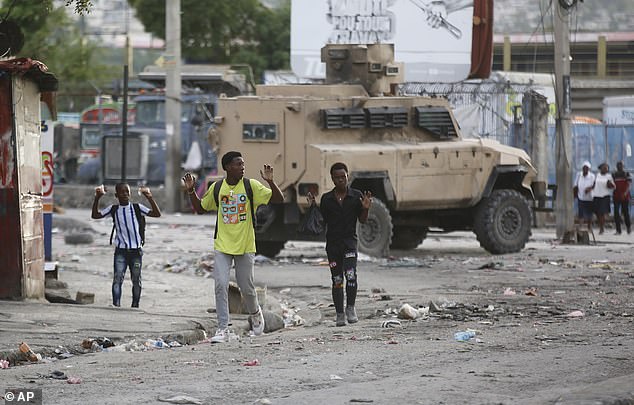

Violence in the Caribbean country erupted last week and has since threatened to topple the local government.
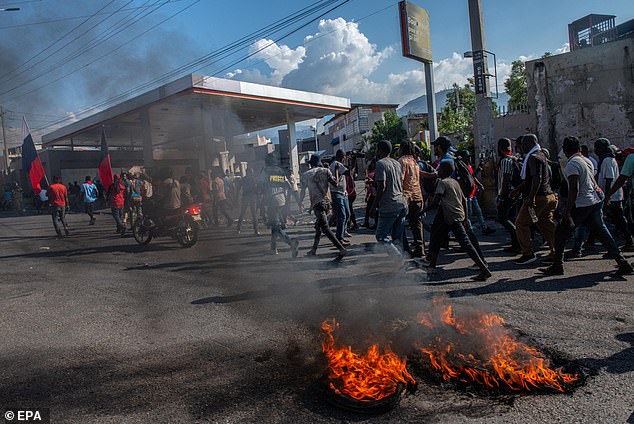

Politicians across the region are scrambling for a solution as dogs have been seen gnawing on the unaddressed dead and bodies are being burned in the streets
‘Many families have been in contact with us, they are very frustrated. In the case of the first group, they are legally the parents of the stranded children.’
Meanwhile in Haiti, desperate American citizens are anxiously awaiting planes to repatriate them.
US embassy staff were evacuated overnight Sunday, but many more citizens remain stranded, although the State Department has yet to confirm exactly how many.
There were warnings that the country has become a ‘mini mafia state’ in the power vacuum caused by the resignation of Prime Minister Ariel Henry on Monday.
An attack on one of Haiti’s largest prisons has left more than 3,500 convicts on the streets, with hospitals under siege and widespread looting.
The violence is led by gang leader Jimmy ‘Barbecue’ Chérizier, who warned of a ‘genocide’ unless Henry resigned.
DailyMail.com has contacted the Foreign Office for comment.

